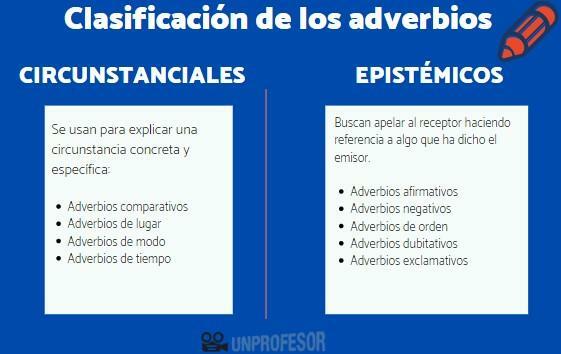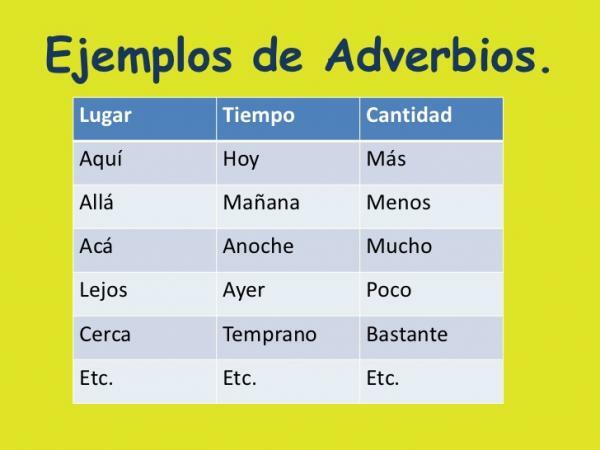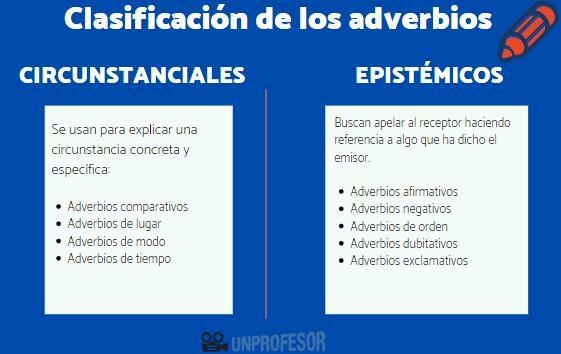Classification of ADVERBS

Every day, when we express ourselves, we use different types of words, something that makes our language very rich and helps us communicate effectively. When we elaborate a sentence we use nouns, verbs, adjectives, adverbs, prepositions, etc. All this together makes us manage to use the language correctly. In this lesson from a TEACHER we are going to see what they are and classification of adverbs in Spanish.
In the first place, to know what the classification of adverbs is, we must know what these types of words are like. The adverbs are invariable words that have a full lexical meaning.
Adverbs, because they are invariable, they do not present any inflection or gender or number. In general, they do not have derivative morphemes either, except for those that end in –mente.

Now that we know what adverbs are, let's see what types we can find in Spanish. Thus we can point out that we find two great types of adverbs:
- Circumstantial adverbs
- Epistemic adverbs
Circumstantial adverbs
Circumstantial adverbs are those that are used to
explain a concrete and specific circumstance in which the action of the verb of the sentence has been carried out. Thus, within these circumstantial adverbs we find the following:- Comparative adverbs: used when you want to indicate the amount or proportion of something with respect to the verb. These might be; more, less, very, little, much, enough, only, almost, so, so much, nothing, approximately.
- Adverbs of place: are those circumstantial adverbs that express a relationship of space with respect to the action of the verb. Some of them are; there, here, up, down, near, far, together, behind, in front, around.
- Adverbs of manner- Used to mark how an action has been performed in a specific way. Here we find the following adverbs; bad, regular, good, slow, fast, slowly, better, worse, stupendously, faithfully, tremendously.
- Time adverbs: are those that establish a temporal relationship with respect to the action of the text. Here are a few examples; before, after, soon, later, late, early, tomorrow, always, never, promptly.
Epistemic adverbs
Spystemic adverbs are those that seek to appeal to the receiver by referring to something that the sender has said.
- Affirmative adverbs: these are the epistemic adverbs that express an affirmation or that it is in agreement with what has been indicated. These are; yes, surely, also, true, clear, indeed.
- Negative adverbs: we refer to negative adverbs when they express disagreement with what has been said or denial. So we can meet; no, never, never, either.
- Adverbs of order: these adverbs are used when we want to show a sequence or an order. These are; first, first, lately, later.
- Doubtful adverbs: are the ones used when we want to express a doubt about what has been said. Here we find; maybe, maybe, probably, maybe, it can be, maybe.
- Exclamatory adverbs: they will be used when looking to exclaim or question within a sentence. These are often accompanied by signs of question or exclamation mark. They will be; when, how, why, where

Within the adverbs we can find different degrees. That is, some adverbs are used to establish different comparison relationships between two or more realities or objects. We can therefore find the following degrees:
- Positive: it is used when the adverb appears expressing a circumstantial property
- Comparative: when we compare two or more objects or realities.
- Superlative: when one of the adverbs to make an extreme comparison. To build it, the ending -ísimo is added.
Next we are going to see some sentences in which we are going to use the different types of adverbs that we have in Spanish.
- There we are not welcome. (Adverb of place)
- Yesterday We went shopping. (Time adverb)
- Later from the accident, Manuel is recovering slowly. (Adverb of time and manner)
- As soon as I found out what had happened I went to the hospital quickly (Adverb of time and manner)
- Until nowWe hadn't had a problem finding parking. (Time adverb)
- The pipe break took place before for us to get home. (Time adverb)
- Unfortunately, we could not enter the room. Tickets were sold out and we couldn't buy them on time. (Adverb of manner and time)
- I like more this car than the one you had before. (Comparative and time adverb)
- Miguel arrived early to his friends' house. (Time adverb)
We hope that this lesson on the classification of adverbs in Spanish has helped you to know them better and to identify them in a simple way. You can continue learning by consulting our different sections where you will find lessons on different subjects that will help you learn day by day and improve your studies.

Image: Google Sites

